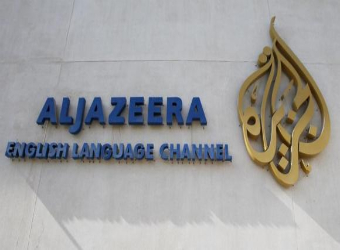Following the arrests of journalists working for Al-Jazeera in Cairo, writer Hugh Miles looks at why the broadcaster has become a target for the Egyptian authorities.
Since the overthrow of President Mohammed Morsi in July this year, the climate for journalists working in Egypt has become much tougher.
As the security situation has deteriorated, anyone questioning the official line on current events has come to be regarded, at best, as highly suspicious.
Although they have not quite put it in these terms, the current Egyptian government’s approach to the media appears to be that you are either with us or against us. And against us means being with the Muslim Brotherhood – which last week was declared a terrorist organisation in Egypt.
Thorn in the side
The battle over the media is a key factor in the struggle for power in Egypt and almost every Arabic language channel viewed as sympathetic to the Muslim Brotherhood has long since been shut down.
Most were taken off air within hours of the ousting of Mr Morsi.
Only Al-Jazeera has continued to deliver the Muslim Brotherhood point of view in Arabic.
It has aired round-the-clock coverage of the pro-Morsi protest movement, hard-hitting testimony from survivors of the Rabaa massacre in which hundreds of Brotherhood supporters were killed, and exclusive interviews with the handful of Islamist leaders who have managed to escape the ongoing security crackdown, such as at the start of this month with al-Gamaa al-Islamiya leader Assem Abdel-Maged.
Such vigorous support for the Muslim Brotherhood has served to make the network simultaneously the leading TV outlet for the beleaguered Islamist movement and a thorn in the side of Egypt’s new government.
Without Al-Jazeera, the government would otherwise enjoy dominance of the TV news spectrum, so it is easy to understand its frustration.
There can be little doubt the Egyptian authorities would love to shut the channel down altogether if they could, although this is a highly unlikely eventuality given that all their attempts to achieve this in the past have failed.
During the Hosni Mubarak era, the information ministry used a variety of ingenious methods to try to silence Al-Jazeera, including preventing it from using Egyptian government studios, blocking its satellite feed, detaining its correspondents and forcibly deporting its family members.
Despite this, in January 2011 Al-Jazeera was viewed by many as playing a leading role in fomenting the unrest that led to the toppling of President Mubarak.
Trump card
After the revolution, tensions between Egypt’s rulers and the network persisted.
In 2011, an Al-Jazeera journalist was seized from a plane at Cairo airport and arrested, and the network’s Cairo offices were ransacked twice in one month after Egyptian officials blamed the network for stoking up anger against Israel and provoking a mob attack on the Israeli embassy in Cairo.
None of this had much impact on the channel’s output.
Al-Jazeera’s trump card is the staunch political and financial backing it continues to receive from its backers, the government of Qatar.
Although the Qatari royal family is more pragmatic and less ideological than the Muslim Brotherhood, the two share a good deal of ground intellectually and have a well-established relationship.
Both of them could be described as Islamists, and both make clear they are above all else devout Muslims who seek guidance from early Islamic sources.
Several of Al-Jazeera’s key figures, such as Sheikh Yusuf al Qaradawi, the religious thinker and presenter of one of Al-Jazeera’s most popular shows, are long standing members of the Muslim Brotherhood.
The former Emir of Qatar, Sheikh Hamad bin Khalifa al-Thani, who stepped down earlier this year in favour of his son, Sheikh Tamim, took a major role in leading the intellectual discourse in the region, especially in terms of political Islam.
As the Brotherhood rose to power in Egypt, he saw an opportunity to exercise influence on Islamist activists congenial to his own religious beliefs – although even under President Morsi this support was not uncontroversial, as tensions occasionally flared over who should be the rightful leader of the Arab Islamist movement.
With the removal of the Morsi government, Qatari efforts to control and influence political Islam in Egypt were abruptly curtailed.
But despite that, and despite these recent arrests, in an increasingly divided Arab world, the Al-Jazeera network remains the standard bearer for the Islamist position and an aggravation for the Egyptian government.
Source: BBC



